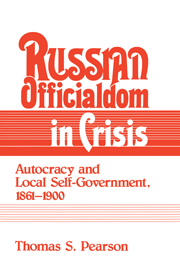Book contents
- Frontmatter
- Contents
- Preface
- Acknowledgments
- 1 Introduction: old problems, new principles – tsarist government and the Great Reforms
- 2 The birth of a new rural order: the state and local self-government, 1861–75
- 3 The breakdown of tsarist administrative order, 1875–81
- 4 The debate revived: state, social change, and ideologies of local self-government reform, 1881–5
- 5 State control over local initiative: the Land Captain Statute of 1889
- 6 The politics of the zemstvo counterreform, 1888–90
- 7 Conclusion
- Select bibliography
- Index
6 - The politics of the zemstvo counterreform, 1888–90
Published online by Cambridge University Press: 08 October 2009
- Frontmatter
- Contents
- Preface
- Acknowledgments
- 1 Introduction: old problems, new principles – tsarist government and the Great Reforms
- 2 The birth of a new rural order: the state and local self-government, 1861–75
- 3 The breakdown of tsarist administrative order, 1875–81
- 4 The debate revived: state, social change, and ideologies of local self-government reform, 1881–5
- 5 State control over local initiative: the Land Captain Statute of 1889
- 6 The politics of the zemstvo counterreform, 1888–90
- 7 Conclusion
- Select bibliography
- Index
Summary
Although the land captains legislation constituted the nucleus of Tolstoi's policy to bureaucratize local self-government, as we have seen, historians have devoted much more attention to the Zemstvo Statute of 1890. Such concern is not surprising. On the one hand, more than other self-governing institutions, the zemstvo involved the educated public and was identified by defenders and critics alike with the constitutional development of the tsarist regime. On the other hand, the very changes that the zemstvo counterreform project underwent from 1888 to 1890 have spawned controversy and led historians to interpret the final legislation diversely as “a complete distortion of the 1864 Statute” and as “nothing more than a second, much worse variant” of its predecessor. Even Tolstoi's motives for drafting the zemstvo legislation have aroused scholarly debate, with most historians depicting Tolstoi as a clear-cut reactionary whose policy consisted of responding to exogenous political forces of the period, be they the “constitutionalist” demands of zemstvo leaders or gentry class interests. The reasons for this are clear enough. The limitations on zemstvo autonomy and the increase in gentry representation were truly the most visible effects of the 1890 statute.
Yet if we look beyond the usual state–society paradigm (that has led historians to contrast the zemstvo's status under the legislation of 1864 and 1890) and search for the connecting threads between the land captains and zemstvo proposals, a different picture of Tolstoi emerges. The minister was convinced by experience that strong, efficient local government responsive to the needs of the population offered the best hope for order and public support in the provinces.
- Type
- Chapter
- Information
- Russian Officialdom in CrisisAutocracy and Local Self-Government, 1861–1900, pp. 210 - 244Publisher: Cambridge University PressPrint publication year: 1989



